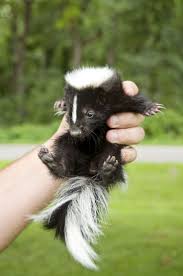
Hi my name is Brendan Mangnitz, I have been in the Nuisance Wildlife Removal industry now for nearly 6 years since I graduated from College at UF with a background in Entomology and Wildlife Biology. I have seen and controlled just about any wildlife issue you may think of. I have dealt with skunks in apartment complexes, skunk removal from your everyday household, skunks in the attic, skunks digging up yards, skunks in pools, skunks stuck in chimneys, and the list goes on and on. I have used several different control and removal methods for skunks and that’s what I want to share with you guys on our website here at http://animalcontrol-experts.com.
I caught the Skunk what do I do next?? Simple – Humanely relocate the animal. Skunks have a great sense of smell and direction. So after you trap the skunk you want to make sure you relocate it from far away from your yard, 25 miles or so should do the trick. Every state and county is different, you will want to contact your local wildlife management agency like fish and wildlife commission and get their state statutes on relocation. Generally it’s a 40 acre plot of land where you have written consent from the owner. You want to relocate the skunks to an area that you know they will thrive in and be safe. Examples of good areas would be like wildlife management preserves, forests, areas that are their natural habitat.

When you have the animal in the trap you want to make sure that you handle the animal safely. DO NOT put your fingers in the trap, do not mess with it, the animal can scratch or bite you which would then be a rabies scare you would need to go and get tested. What you need to do is buy good Kevlar Gloves like THESE and these are rated for animal handling. If you caught the animal the law states that the animal has to be released from the trap within 24 hours of the skunk being caught. The sooner the better because the longer that the animal is in the trap the more it will suffer. We want to focus on humane and safe animal trapping.
Traps have a handle on the top of the trap and a safety plate. You want to grab the handle of the trap, NO OTHER AREA of the trap. The skunk may try and stick its arm out of the trap, that is why you want to wear the Kevlar animal handling gloves and only hold the handle. Be careful when you are holding the trap, don’t keep it to close to your legs or it may reach out and try to grab your legs or shoes. Be very safe when holding the trap and transporting the animal.
Finally when you have chosen the area in which you are going to want to relocate the skunk you will want to safely set the skunk trap down. Point the trap away from you, and in the direction in which you intent to relocate the animal. ALWAYS stand behind the trap when you are ready to release the animal. You will want to push down on the safety bar and spring, this will then allow the door to be pulled up. Then you will want to pull the door all the way up, this will allow the skunk to safely exit the trap. Generally, the skunk will run right out of the trap. In the event that the skunk slowly leaves the trap and is facing you put your arms in the air as if you are a bear and make several loud predator sounds this will scare the skunk causing the it to leave and run away.
And that is my How to Guide when it comes to skunks on your property and how to remove them. Like I have mentioned, my name is Brendan Mangnitz, I have being doing pest wildlife and skunk removal now for over 6 years. I have worked and trained hundreds of people over the past several years. It takes time, skill, and patience but removing skunks can be dangerous, but is also something that we deal with on a daily basis here. Skunks have learned how to thrive and do great in the urban setting. This is not something that is going away. With more and more houses coming up everyday, more land being constructed and developed we will always have issues with skunks in the garden and lawn. Just read and learn how to protect yourself you family and your home and you should be good to go. If you have any questions you can email directly at brendan@247wildlifecontrol.com or call my cell 1-321-236-9031 any time of the day or night 24/7 THANKS!